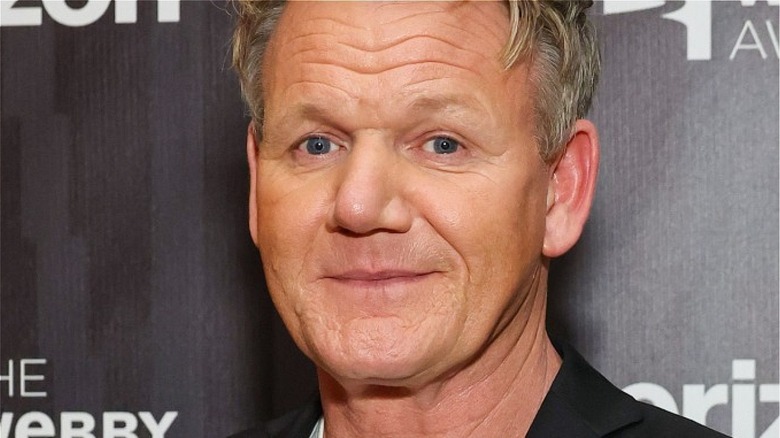The Bizarre Reason Gordon Ramsay's Gin Ad Just Got Banned
Although Gordon Ramsay once mentioned on a 2016 episode of "The Tonight Show Starring Jimmy Fallon" that his favorite cocktail was a "Wake Up, You Donkey," per Refinery29, the chef's gin brand is getting a different type of wake-up call. A recent advertising campaign for Ramsay's Gin, a collaboration with Eden Mill St Andrews, has caused a rebuke from the Advertising Standards Authority, according to The Guardian. Although Chef Ramsay can tout that his gin is the option "when ordinary just isn't enough" (via Vimeo), those superlatives are implied as advertising conjecture.
Made with botanicals from the Scottish coastline, it appears that the gin brand concept was to blend the chef's heritage with sustainable ingredients to create its particular flavor. While social media posts, commercials, and other endorsements can entice people to purchase a bottle, some laws seek to limit statements that could be misconstrued as fact or imply health benefits.
Within Scotland, the Advertising Standards Authority offers guidance on how companies can avoid "misleading or disappointing consumers." And in a recent social media post from Ramsay's Gin, the liquor brand apparently crossed the line and faced a retort worthy of a "Hell's Kitchen" dressing down.
How did Ramsay Gin shake up an advertising controversy?
For gin drinkers, the particular combination of botanicals gives each spirit a unique presentation. Ramsay's Gin from Eden Mill St Andrews describes its gin as sustainably sourced, with ingredients from the Scottish coastline. But, a recent social media post suggesting the honeyberries, an ingredient in the gin, have micronutrients and other benefits beyond the flavor prompted the Advertising Standards Authority to bring the beverage brand to task.
As reported by The Herald, Ramsay's Gin posted, "With more antioxidants than blueberries, more potassium than bananas, more vitamin C than oranges and a flavour like a mixture of blueberry, plum and grape, these might be the tastiest Honeyberries in the world." Per the advertising code, the only permissible alcohol advertising language claims can reference "low alcohol," "reduced alcohol," and "reduced energy." This honeyberry language crossed the line regarding nutritional claims. The organization ruled that the posts violated standards, were to be taken down, and could not be used again – no, the governing body did not refer to anyone on the gin's advertising team as an "idiot sandwich."
The gin company apologized, obliged, and has committed to avoiding the error in the future.

